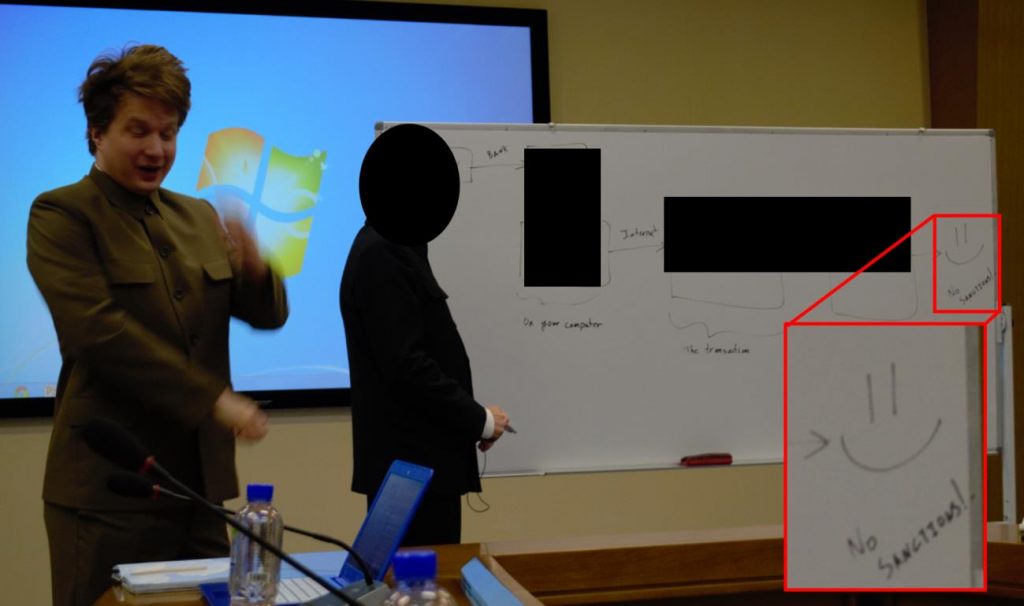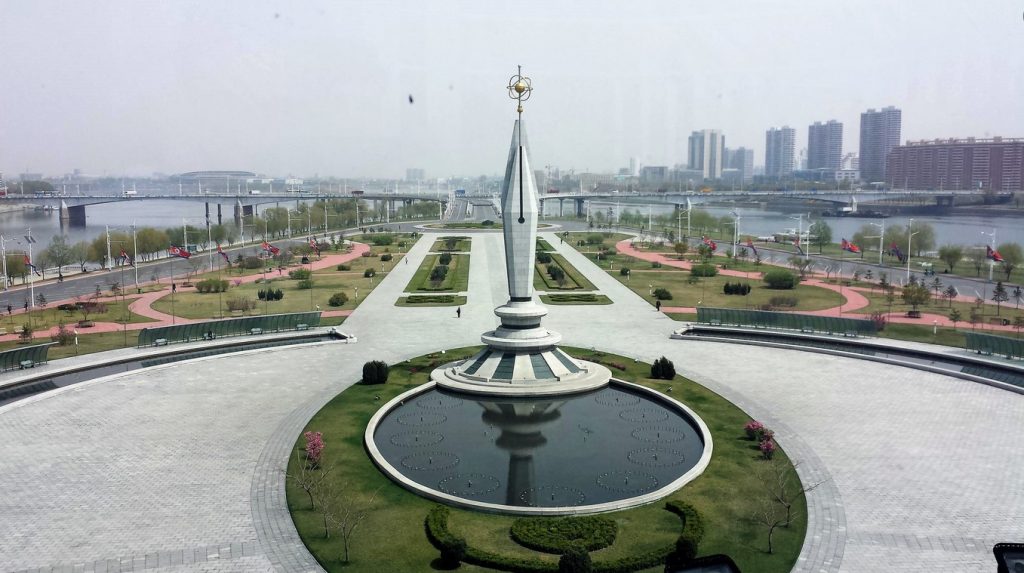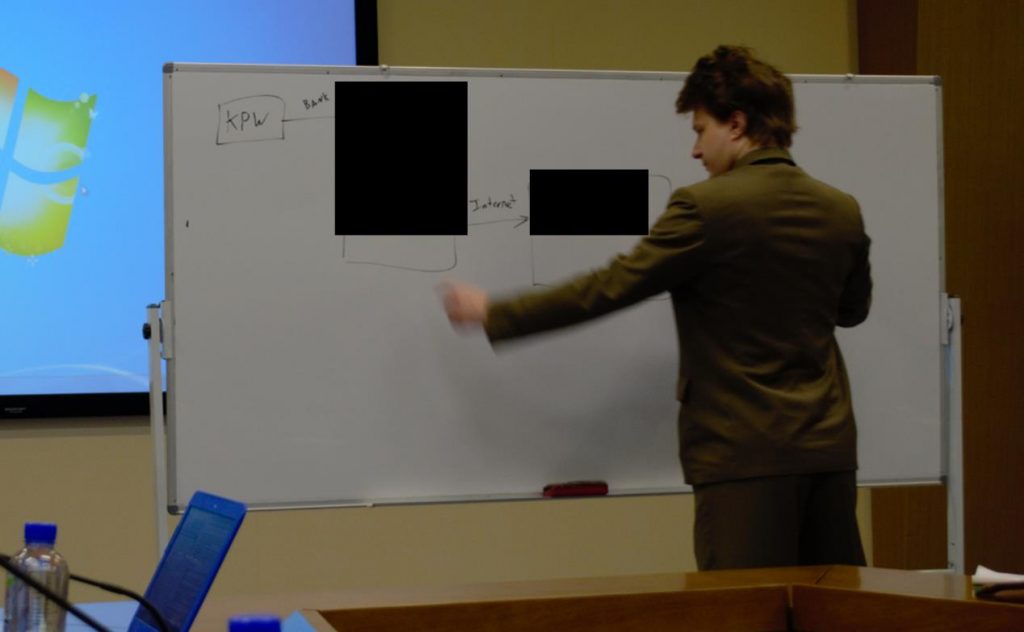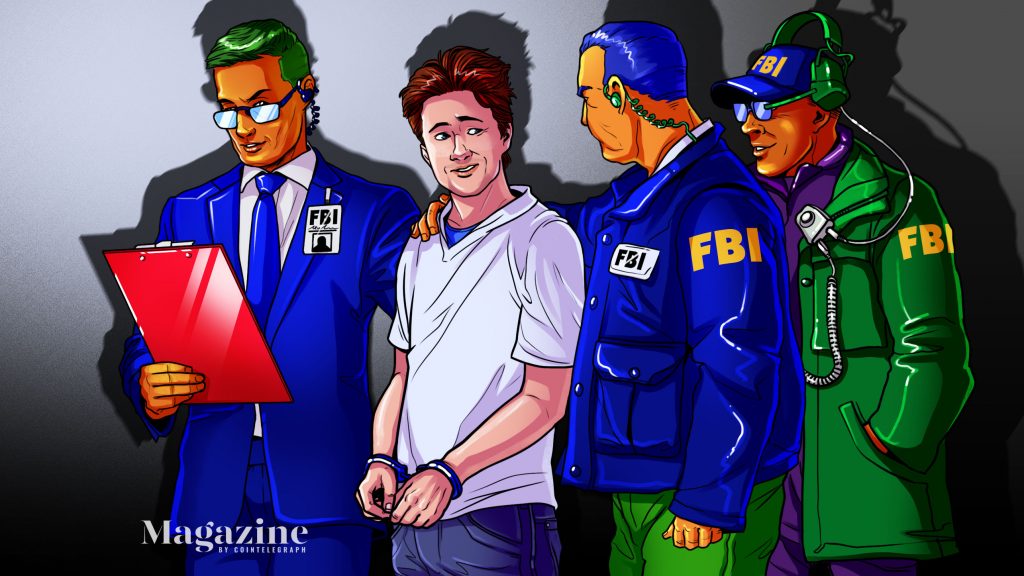Ethereum developer Virgil Griffith took a plea deal after breaking sanctions against North Korea and was formally sentenced earlier today— the final chapter in a two-year journey as bizarre as it is shocking.
Journalist Ethan Lou, author of Once a Bitcoin Miner, attended the infamous event in North Korea at which Griffith spoke. He was asked to submit a statement for Griffith’s sentencing, although that statement was ultimately not filed with the court. Here he tells the inside story of what happened.
Pyongyang, April 18, 2019
Virgil Griffith had been on North Korean soil for only a few hours when he casually told fellow travelers and their local guides that his trip was unsanctioned. Unique in the world, the United States bans its citizens from going to North Korea without explicit permission.
Griffith, an American in Singapore working for the Ethereum Foundation, had sought such permission unsuccessfully, he recounted at the round dinner table at Pyongyang’s riverside Pothonggang Hotel. Griffith had made his case the best he could on why he should go to that Pyongyang cryptocurrency conference in 2019 but was denied. And so, he decided to go anyway, he told people at the table.

Up and at them
Four days later, in a building shaped like an atom, Griffith told a crowd of North Koreans how they could harness blockchain in negotiations with the United States. At the time, bilateral talks had been bogged down by the question of which measure should be unwound first: the United States’ economic sanctions or North Korea’s nuclear program.
Griffith said both could happen simultaneously through a smart contract tied to a North Korean missile.
“If all the news reports say that sanctions on North Korea have been lifted, the missile will deactivate.”
Then, when explaining how smart contracts work, Griffith used the idea to “shave my cat” as an example. His presentations were mostly speculative, farfetched and based on publicly available information. It’s unclear how serious he was — he certainly had not taken the U.S. government’s opposition to his trip seriously.
Unsanctioned
Griffith believed in being forthright, even if it was uncomfortable. Almost immediately after returning to Singapore, Griffith went to the local U.S. embassy to talk about the trip with a special agent. Perhaps, in some way, he thought he was doing his government a favor by telling them all about the cloistered kingdom. Griffith did not expect that meeting to ripple throughout the U.S. government, but Special Agent Brandon Cavanaugh of the Federal Bureau of Investigation’s counterintelligence unit in New York was soon brought into the fold, and then the circle grew to three lawyers from the Justice Department plus Treasury Department attorneys. On Thanksgiving of 2019, Griffith was arrested in Los Angeles.
Accused of helping North Korea bypass sanctions by teaching it about blockchain, Griffith ultimately accepted a plea deal for 63 months in prison and was sentenced in April 2022.
It was the final chapter in a two-year journey as confusing as it was shocking — the story of how an adventuresome utopian and his North Korean trip had come to disturb the merciless forces of geopolitics and national security.
Griffith, through his lawyers, did not respond to an interview request, but documents filed with the court paint a vivid picture of the days following the trip and the decisions and moves made then — a crucial, illuminating period during which FBI agents as much went after Griffith as he fell into their lap.

Internet Man of Mystery
Griffith was born in Birmingham, Alabama in 1983. He has unruly hair that would later make the North Korean restaurant servers describe his head as “big.” In 2008, a little before Bitcoin first came into the world, Griffith, a hacker, was profiled by The New York Times Magazine and dubbed the “Internet Man of Mystery.”
He once suspended his doctorate studies to participate in the reality show King of the Nerds. He was also taken to court after planning to publicly unveil security flaws in campus identity cards, a matter later privately settled. In Griffith’s words, he is someone who likes to poke the proverbial bear. He once told his parents, “I regularly roll grenades into the room, and someone needs to really jump on it.” A friend described him as viewing life as a video game.
In May 2019, about a month after Griffith met the State Department agent in Singapore, the FBI reached out. Griffith was visiting friends in Puerto Rico, a U.S. territory that had become a bit of a crypto hub, where he had rented a small apartment. The FBI told Griffith it wanted a meeting.
Griffith agreed immediately. He had little sense of any danger to himself. He did not hire a lawyer and traveled to New York at his own expense. Among the FBI employees he would meet was Special Agent Cavanaugh.

Plead the Fifth
Griffith showed the agents photographs of himself in North Korea and provided to the FBI propaganda he had taken home as souvenirs, including newspapers and other literature. Visually, Pyongyang had been eye-opening for Griffith, with the pastel colors of its apartment buildings evoking, in his view, a Wes Anderson movie.
North Korea’s insular culture fascinated Griffith so much that he got a tailored Mao-style suit. Much of the country’s literature was also unintentionally funny. One newspaper headline Griffith saw in North Korea read, unironically, “Institute for women set up under the care of great men.” A coffee-table book he brought back used the Comic Sans font. Griffith treasured his North Korean souvenirs to such an extent that he sent them to the nonprofit Internet Archive to be digitized.
However, what the government saw in the material Griffith brought from North Korea was starkly different. Michael Krouse, a Justice Department lawyer and former U.S. Marine, would later take note of Griffith’s Mao suit and, together with his colleagues, observe that Griffith dressed in a “North Korean military-style uniform.”
For Special Agent Cavanaugh, the gist of his takeaway from that May meeting was that Griffith knew that going to North Korea to teach blockchain was illegal but did so anyway, intended to do so again, and wanted to make a symbolic cryptocurrency transfer between North and South Korea. Cavanaugh was not going to let that go.

Better get a lawyer, son
On Nov. 12, Griffith was on a business trip in Northern California. The FBI reached out again, and Griffith and Cavanaugh once more found themselves in the same room, this time at the FBI’s San Francisco field office. Griffith had gotten a little spooked from his last meeting, but he again did not hire a lawyer. And this time, Griffith also gave the FBI permission to search his phone.
Griffith’s decisions may seem baffling. Before one of those FBI meetings, he talked about it with his friend Eric Corley, an editor for a hacker magazine, for whom he once wrote. In his recollections, Corley said he tried to dissuade Griffith from going: “I kept warning him it was a trap.”
But Griffith “insisted” on going to the FBI and “telling the truth” without a lawyer, Corley said. The presentation Griffith had given in North Korea amounted to no more than publicly available information, he thought. He did not believe he had done anything wrong. Shortly after that meeting, Griffith “was convinced they totally got where he was coming from,” Corley said. He called Griffith’s sentiment “ironic.”
Day 3. We took a look at where the conference was held. This is the very room in which Virgil Griffith spoke to the North Koreans. We, eight foreigners, would be seated around that circular table. They called us a “delegation.” 20/15 pic.twitter.com/T94mxrldKA
— Ethan Lou (@Ethan_Lou) October 27, 2021
North Korea, accused of rampant human rights violations and pursuing nuclear weapons against the international order, has long been under a blanket of economic sanctions, often led by the United States. Those sanctions punish North Korea economically by barring it from international trade, which the U.S. is able to do because it effectively controls the global financial infrastructure. Cryptocurrency is theoretically a way for North Korea to get around that. After all, the country has already been accused of hacking and stealing hundreds of millions of dollars in cryptocurrency. Griffith’s visit had set off all manner of red flags within the U.S. government.
After Griffith’s San Francisco meeting with the FBI, Justice Department officials in New York worked hard to build a case against him. It was not without its challenges, and the matter came to a head a little after midday on Nov. 18. Another Justice Department lawyer, Kyle Wirshba — a Harvard Law School graduate with a gentle voice — learned that the Department of the Treasury had issues with the case. The department’s Office of Foreign Assets Control said it was “a gray area” because it might not be illegal if Griffith’s presentation in North Korea was general information and not tailored for the audience.
Did the Justice Department know the specific nature of Griffith’s presentation? That information became urgent and vital. If the matter went to trial, a Treasury Department expert would need to testify to support the charges. That afternoon, Wirshba posed that question to the FBI’s Special Agent Cavanaugh. He also wrote to his fellow lawyer Krouse, telling him about another government official: “So, of course, the deputy chief has problems.”
COUNTDOWN TO SENTENCING: Virgil Griffith Pled Guilty To North Korea Sanctions Violation Conspiracy, Now Asks For 24 Months While US Probation Recommends 63 Months; Vitalik Buterin Urges Mercy – Inner City Press story: https://t.co/JF5hUuZJ0b pic.twitter.com/o5PKFaBO63
— Inner City Press (@innercitypress) March 5, 2022
Around this time, the Justice Department faced another issue: The gravity of the matter had finally dawned on Griffith. He knew that he had told the FBI that North Korean attendees left the conference with a better understanding of cryptocurrency than when they arrived, that he had acknowledged that his talk amounted to a “non-zero tech transfer,” and that Cavanaugh, perhaps, did not really believe him when he said he only talked about publicly available information. Around this time, Griffith hired a lawyer.
So, if Griffith were no longer going to cooperate with the authorities, perhaps he would run? The FBI deemed Griffith a flight risk and needed to arrest him quickly. The bureau told Griffith not to leave the country, but Griffith was under no obligation to comply. And without the Treasury Department’s support, there was no justification to detain him. The case no longer appeared so easy.
On Nov. 18, the same day that Wirshba learned of the Treasury Department’s concerns, a busy afternoon unfolded at the Justice Department. By 8:00 pm, it had bugged a lawyer from the Treasury’s Office of Foreign Assets Control too many times. In an email to his colleagues that night, Cavanaugh said: “DOJ asked us to hang on reaching out to the OFAC. Apparently, one or more people have already reached out […] and he’s becoming frustrated. Just wanted you to be aware of the sensitivity.”
Don’t skip town
Depending on your perspective, the Justice Department either thought too little or too much of Griffith. As he was based in Singapore, he had not made arrangements to be in the United States beyond that business trip to Northern California. He also knew unequivocally by then that the law was after him. But Griffith complied with the FBI’s request that he not leave the country.
He stayed with friends in Los Angeles and also decided to spend Thanksgiving with his parents and sister’s family in Baltimore. He told the authorities of those travel plans and sent his itinerary through his lawyer to ensure they knew where he was and that he was not trying to run away.
Griffith still believed in doing the right thing and that it was important to have demonstrated that he tried to follow the rules. He believed in the integrity of the justice system, that everyone gets what they deserve and that the innocent have nothing to fear. A question would arise in the coming days: Was Griffith some sort of scheming mastermind? A traitor bent on undermining his own country? The days following North Korea show that the answer is complicated.

Despite all the damning accusations against him, Griffith had a certain honesty — a naivety perhaps reinforced by his involvement in the cryptocurrency space, where the law was lax and the only moral compass people had to guide them was their own. Deep in that world, Griffith had simply been too far removed from the wider world with its own values and rules, agendas, intricacies and rigidity.
Two days after that frantic day on Nov. 18, following another flurry of emails and a conference call, the Justice Department prevailed. The prosecutor, Wirshba, had gone to bat with the Office of Foreign Assets Control during the call, and in the view of his colleague Krouse, that conversation went well — “thanks to Kyle’s advocacy.” The OFAC said that, if requested at trial, it would provide a witness to testify that Griffith had broken the law.
The FBI has disclosed that agents from other investigations accessed Twitter, Facebook data in Virgil Griffith/North Korea crypto case because *default setting* in Palantir is to allow all FBI agents access to everything from all cases. That’s quite amazing. pic.twitter.com/DP7Kq3NGce
— Martyn Williams (@martyn_williams) August 26, 2021
Arrested
About a week later, on Thanksgiving morning, Griffith was arrested while boarding a flight from Los Angeles to Baltimore, based on a formal complaint from Special Agent Cavanaugh in New York — sworn just one day after Wirshba resolved the Treasury Department’s concerns. The complaint was eight pages and more than 2,000 words, but where it discussed the facts of what happened in North Korea, it contained not even a single piece of information from sources other than Griffith. It was just the man’s own words over the past seven months that had been weaponized against him.
From there, a new chapter in Griffith’s life began. Even when he was later released on bail for a period, he had to abide by strict conditions. Griffith was eventually held in New York’s infamous Metropolitan Detention Center, an unpleasant preview of the future that loomed for him. At that moment at the airport on Thanksgiving of 2019, when the law took him away under the dull and steely sky, Griffith had just experienced his last day of freedom, though he did not yet know it.
Lou writes about the North Korea affair in-depth in his new book, Once a Bitcoin Miner: Scandal and Turmoil in the Cryptocurrency Wild West. Check out Magazine’s Journeys in Blockchain profile of him below.
